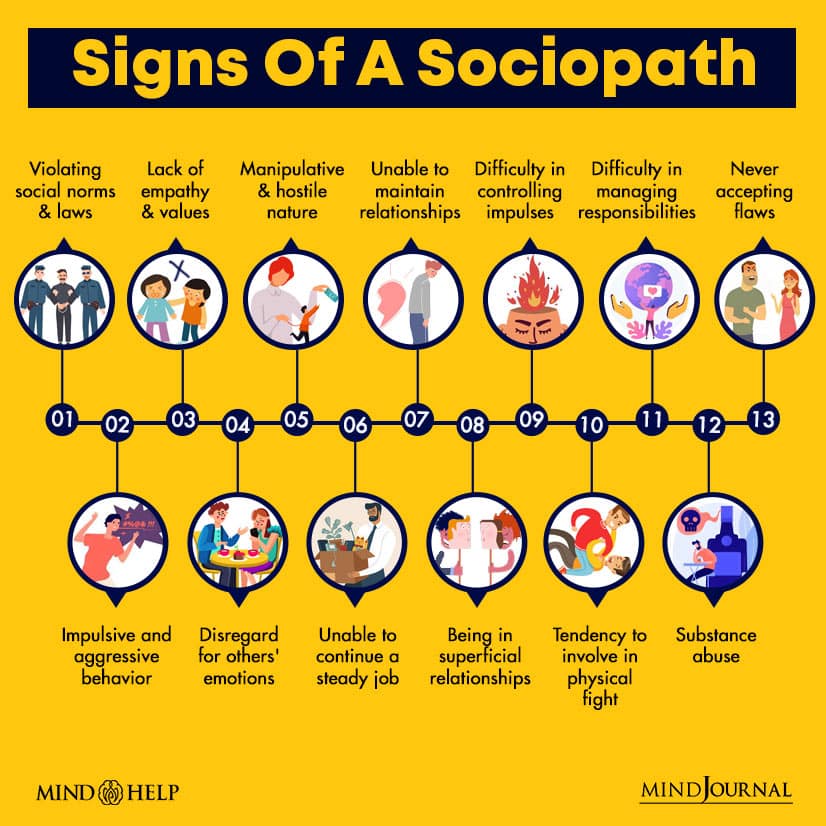Someone with antisocial behaviors, lack of guilt, and disregard for others can be termed a sociopath. The scary thing about a sociopath is that anybody can be one. Below are the traits of a sociopath that will help you to avoid them.
Understanding how exactly the minds of sociopaths work, we can find how to take our power from them! But before we get into the signs of a sociopath, let’s understand what exactly sociopathy is.
What Is Sociopathy?
It refers to anti-social behaviors or suffering from a mental condition known as an antisocial personality disorder where a person has persistent difficulty following appropriate norms of society.
What Are The Traits of A Sociopath? 8 Characteristics Of A Sociopath

1. Sociopathy lies on a spectrum
Sociopaths cannot be easily identified. As a matter of fact, it is extremely difficult and sometimes confusing to understand who is an actual sociopath. So much so that, at times professionals like psychologists and psychiatrists are also fooled.
Additionally, certain people showcase more sociopathic traits than others, which is why sociopathy lies on a spectrum. While some sociopaths are more open about their narcissism, some are more secretive about it.
That is just one of the many differences and examples. This is why several terms have been used to describe people who display atypical personality traits, including narcissists, psychopaths, and sociopaths.
Furthermore, what fuels the confusion is that researchers, therapists, and psychologists do not agree regarding which term sought to be used or what their definitions should be. Despite this disparity, the truth still stands: anyone who exhibits sociopathic qualities of any kind is toxic and ought to be avoided at all costs.
2. Sociopaths have no conscience whatsoever
They know the inherent difference between what’s right and wrong. They understand society’s expectations. They understand what moral behavior is supposed to look like. They even understand that actions have consequences. But, they do not care, and not even for a second.
Sociopath signs may include feeling no guilt or remorse at all, and that is what makes them dangerous to be around. This lack of conscience makes them step on the feelings, rights, and safety of others. They have zero limits and are scarily capable of anything and everything. In short, it is a recipe for unending perversion and cruelty.
Related: How To Spot A Sociopath
3. Sociopaths have an extremely finite range of human emotions.
Sociopaths rarely experience empathy, which makes them essentially emotionless shells. They have “shallow” feelings, which means that, if they have any emotions at all, they are almost all transient.
They appear to be experiencing intense hatred and envy, which encourages many of them to act aggressively. Any rage they exhibit is remarkably fleeting.
Due to this shortcoming, they fail to connect with other people on an emotional level and develop stable and meaningful relationships. Empathy, compassion, sympathy-all these emotions are alien to them.
They only get meaningless and short-lived thrills out of things like food or sex and are also experts at manipulating, dominating, and betraying other people. Most ominously, this emotional deficiency means that they are unable to love.
This leads to emptiness and the hollow feeling that makes them chronically bored. This is why, it is very common for sociopaths to become addicted to drugs, sex, and alcohol.
4. Sociopaths consider everything in their lives to be won
One of the most dominant traits of a sociopath is that they are obsessed with winning, and worse still, winning at any cost. Since they cannot build real relationships, they approach their interactions with others similar to that of a game. The other person is simply a dispensable pawn in their twisted game of manipulation and greed.
Signs of sociopathy include using tactics like deception, mirroring, pity plays, gaslighting, manipulating, and other forms of physical and emotional abuse to idealize, intimidate, confuse and trick others, all in the name of “winning.”
5. Sociopaths are experts at exploiting people
The ultimate goal in the life of every sociopath is to do whatever it takes to get what they want at that moment. Since sociopaths do not understand love, they objectify other people as things that can be obtained, used, and then discarded.
So when they interact with others, they follow a similar pattern—idealize, devalue, and discard—over and over again. Their desires change abruptly and unexpectedly; at any given moment, they might want a place to stay, money or sex, a temporary thrill, or even a cloak of normalcy.
Sociopaths love putting other people down and playing with their emotions like a dog plays with a ball. They feel a disgusting sense of happiness and fun when they see how much their actions are hurting and degrading other people.
Related: 15 Reasons Narcissists and Sociopaths Lie
6. Projection
Most high functioning sociopath traits include projection, they give their targets disguised clues. They tend to criticize people who exploit others and hurt people for their own fun, but they don’t realize that they are perfectly describing themselves. They tremendously gaslight their victims, especially if they are called out on their tricks.
In no way, will a sociopath let the other person put them down, even if they have every reason to. A sociopath’s mantra is – “I can treat you any way I want, but you can never d the same to me.”
7. Telling victims the truth and justifying their actions
Sociopathic traits also include telling their targets exactly who they are, but they do it in such a way that it is impossible for victims to understand the consequences of the horrible statements.
Targets might hear manipulating comments like, “You shouldn’t be with me” “I’ve never had a good relationship” or “I wanted to hurt someone.” Sociopaths twist these comments into pity plays and justify themselves by exploiting victims when they do not realize the statements are real.
8. They suffer from a superiority complex
Sociopaths are experts when it comes to using people according to their convenience and needs, then discarding them like trash. They feel completely justified in manipulating, stealing, lying, and cheating others. They don’t only realize that they are horrible people, they believe that they are better and superior to everyone!
When they successfully trick or manipulate someone to do their bidding, they believe that they could do it because the other person is weak and dumb. They are extremely arrogant and morally corrupt, and due to this reason, it makes it impossible for them to benefit from therapy, or to change as a person.
Although it is tough to wrap our brains around this kind of mental illness, doing so can help us protect ourselves.
Related: 50 Shades of Sociopath: Spotting Manipulators, Liars, and Abusers
If you want to know more about the traits of sociopaths, then check this video out below:













Leave a Reply